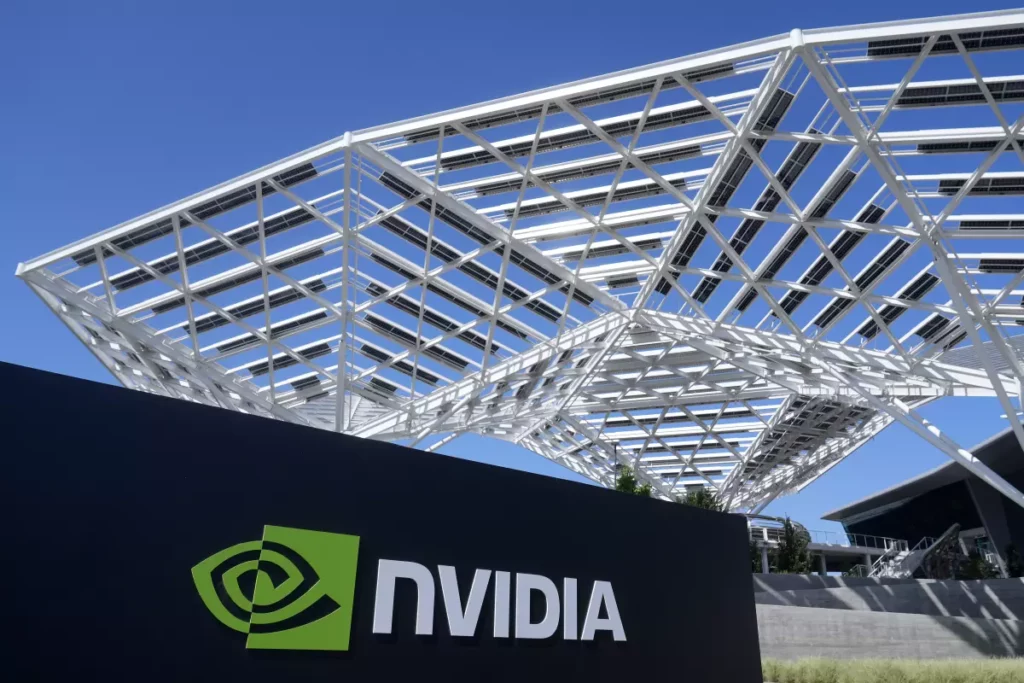Nvidia beats earnings expectations as investors eye demand for Blackwell AI chips

On Wednesday, Nvidia revealed a spike in third-quarter profit and sales as demand for its specialized computer chips driving artificial intelligence systems stays strong.
With sales of $35.08 billion, up 94% from $18.12 billion a year ago, the software behemoth based in Santa Clara, California, reported for the three months that concluded October 27.
More than twice the $9.24 billion it reported in last year's third quarter, Nvidia claimed to have made $19.31 billion in the quarter. One-time item adjustments let it earn 81 cents a share.
FactSet shows Wall Street analysts had been projecting adjusted earnings of 75 cents a share on revenue of $33.17 billion.
Investors grabbed the data in stride, although Nvidia's soaring stock dropped almost 1% in after-hours trade. Thus far this year, Nvidia Corp.'s shares are up 195%. Fourth-quarter sales, according to Nvidia, should reach $37.5 billion, plus or less 2%. Usually, analysts project $37.09 billion.
"The age of AI is in full steam, propelling a worldwide shift to Nvidia computing," Nvidia founder and chief executive Jensen Huang remarked in a statement.
Up 112% from a year ago, Nvidia's third-quarter data center revenue came out to be $30.8 billion. Demand for the Hopper computing platform for massive language models, recommendation engines and generative artificial intelligence applications drove that expansion, the company said.
Analysts were looking at Nvidia's advice on the Blackwell graphics processor unit, a next-generation artificial intelligence chip in demand by companies such OpenAI and others building AI data centers.
According to Nvidia Chief Financial Officer Colette Kress, Blackwell manufacturing shipments are set to start in the fourth quarter of fiscal 2025 and will keep rising into fiscal 2026.
On an earnings call Wednesday, Kress informed investors that "the demand for Blackwell is expected to exceed supply for several quarters in fiscal 2026," while the Hopper GPU has "certain supply constraints."
Every client is sprinting to be the first to market, Kress remarked. "Blackwell is now in the hands of all of our major partners; they are working to bring up their data centers."
Considered as a harbinger for artificial intelligence demand, the company would provide "more Blackwells than we had previously estimated" this quarter, Huang said.
As tech behemoths invest extensively on the chips and data centers required to train and run their artificial intelligence systems, Nvidia has led the artificial intelligence sector to become among the top businesses on the stock market.
Thanks in part to Huang's wise bet on the semiconductor technology driving the sector, the company staked up an early lead in the AI applications race. Big bets are not unfamiliar to the corporation. Graphics processor chips, or GPUs, created by Nvidia in 1999 changed computer graphics and helped drive the PC gaming industry forward. Rising to $3.3 billion, the company's third-quarter gaming sales grew 15% from a year ago.
Though David Volpe, senior fund manager at Emerald Insights Fund, stated "a little bit disappointing," Nvidia nonetheless had "a great quarter."
"In terms of the growth, there is nothing touching it," Volpe remarked.
Sales of Nvidia's specialist chips over the past year have been driven by demand for generative AI devices that can compose documents, create graphics and act as personal assistants. Now valued above $3.5 trillion, Nvidia, the most valuable publicly traded firm by market capitalization as of Wednesday morning, is under constant observation by experts toward a $4 trillion target.
Analyst Dan Ives of Wedbush Securities claimed the earnings report indicates "the AI Revolution is still in the early innings of playing out."
"We see this as an Nvidia earnings press release that ought to hang in the Louvre," Ives added. "Blackwell demand is just starting here. Any sell-off [in Nvidia's stock] we would consider as transient, given our view this is a $4-trillion market cap in 2025 as the Godfather of AI Jensen [Huang] pushes this spending wave.”
Over the first six months of the year, Nvidia's stock skyrocketed about 150%. By then the stock was trading somewhat more than 100 times the company's annual profits over the past 12 months. That is far more costly than both the S&P 500 overall and historical levels.
On the teleconference, Huang declared, "The age of AI is upon us." And it is vast and varied.
Leave a Reply